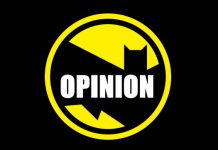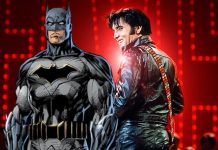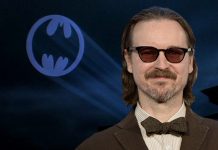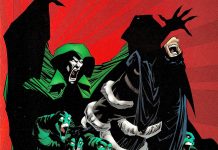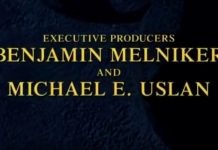EDITOR’S NOTE: This following article by Mr. Uslan was also posted on THE HOLLYWOOD REPORTER. Mr. U sent it to BOF and wanted us to post it as well and we were glad to oblige. – Bill “Jett” Ramey
I’ve had numerous media requests from television and radio to many podcasts and comic book/movie related sites to react to or respond to Bill Maher’s inciteful statements regarding Stan Lee, comic books, and particularly comic book readers and fans. I chose not to respond immediately and emotionally in a knee-jerk reaction, but rather to let a little time go by and give real consideration to my thoughts and words.
It’s a pity that there are people who wait to lash out until someone passes away or becomes incapacitated and cannot defend themselves from attack. As a result, I have felt an obligation and responsibility ultimately to respond on behalf of my idol, mentor, friend, and creative associate, Stan Lee.
If Stan was here right now, he would certainly say to me “don’t respond with the same vitriol, language, or tone of people who are negative or go on the attack. The important way to respond is to educate them, calmly, with facts and reason.”
Attacks like these are almost always born out of ignorance. It harkens back to the 1950s when society looked down its nose at comic books with no respect for the creators or their creations. The writers, artists, editors and everyone associated with the industry were denigrated, castigated, and shunned. There were even comic book burnings in some U.S. cities that chillingly evoked Germany in the 1930s.
Society is always on the lookout for a cultural target for finger pointing when the establishment has issues, especially generationally with its youth. In the 1950s, comic books became the easiest target to blame for the post-World War II rise of juvenile delinquency in America because certainly, society never believes anything is the fault of the establishment, itself, nor its parents, teachers, clergyman, politicians, etc. So in the early 50s, comic books were mounted on the cultural crucifix. To this day, I believe that the comic books as we know them would not have survived that attack had it not been for the emergence in 1955 and ’56 of rock ‘n’ roll music and Elvis Presley. Quickly, the finger turned and pointed at them, instead. They were much bigger targets. Of course, this was followed by 45 RPM rock ‘n’ roll record burnings in cities across our nation. Over the decades, that witch-hunt of blame has moved from comic books to rock ‘n’ roll to Elvis Presley to Saturday morning cartoons to rap to hip-hop to video games, because, again, nothing is ever the fault of society, itself.
So here we are once again with comic books, Stan Lee, and comic book fans and readers in the crosshairs of ignorance. In this current attack, the saddest and worst part is the denigration of the latter. Historically, throughout World War II and the Korean War, the second largest audience for comic books were none other than U. S. Servicemen, fighting for us around the world. In the years following that, there have been many coordinated efforts to ship care packages of comic books to our servicemen who requested them while they were busy watching our backs. To demean comic book readers is to thoughtlessly demean our servicemen.
Who else have been core readers of comic books over the decades? The answer is the kids who grew up to become scientists, researchers, and tech innovators. Most of those people who were inspired by Stan Lee and the modern day mythology he created at Marvel and by comic books in general, are still fans to this very day and credit these comic books with igniting their imaginations, making them believe in themselves the way their favorite super-heroes did, all while creating a true sense of wonder about space, exploration, the future, the environment, and all that could possibly be. Consider comic book geek Neil DeGrasse Tyson who credits comics as one of his inspirations leading him to his career in astrophysics and beyond. Consider one of the most famous fantasy painters in the world, Gregg Hildebrandt of the Brothers Hildebrandt, whose artwork was essential to the defining look of everything from “The Lord of the Rings” to “Star Wars” who grew up an ardent comic book reader and collector and cites them as the primary influence for him and his brother, Tim, in their creative achievements in the art world.
Another aspect of those who rabble-rouse based on their ignorance of comic books and their impact is their tendency to attack comic books in academia. As the person who taught the world’s first ever college-accredited course on comic books, and more recently taught with Stan Lee the Smithsonian Institution’s first on-line Edx course on comic books and the rise of the super-heroes (which initially had well over 100,000 students sign up from over 150 countries), I’m happy to report that there are hundreds of courses on various aspects of comic books being taught at universities and colleges today in our country and many more elsewhere around the world. Why? Comic books are a legitimate American art form as indigenous to this country as jazz.
The modern-day mythology created by Stan Lee, Jack Kirby, Steve Ditko, Jerry Siegel and Joe Shuster, Bob Kane and Bill Finger, William Moulton Marston, Joe Simon and Jack Kirby, Will Eisner, etc. are not simply entertaining the masses as they are continually being adapted to movies, television, animation, and video games, but they are also impacting and helping mold the ethical and moral codes of generations of comic book readers and fans who are truly inspired by the behavior and deeds of their super-heroes. Consider the global impact of the work of Stan Lee, for example. His mythology has transcended cultures as well as borders and has reached billions of people on this planet. That alone ranks his contribution with that of Walt Disney, Aesop, and maybe even a guy called Homer.
Back in the 1940s and 50s, especially, an easy way for someone unfamiliar with comic books, its creators, and the intelligence level of its audience, was to dismiss the intellectual value of comic books with the charge that they had pictures in them and not just words. Today, that same charge can be labeled “blissful,” assuming that ignorance is bliss. Such a claim, rooted in no facts, ignores the contribution of Stan Lee as he and the greatest artists in the history of pop culture ushered in the Marvel Age of comics by gradually making graphic story-telling more mature and more sophisticated, reaching up to high school, college, and adult audiences. Gone were the cardboard characters of the past. Layered, textured characters dealing with human foibles and frailties in their relationships were placed in what felt like more real-world environments than comic book readers had been exposed to before. In that maturation process, Stan Lee created a personal, respectful rapport with his readers, never talking down to them, and making all of us feel as if we were in a personal… albeit it quite subversive… club. In particular, “Stan’s Soapbox“ each month was not there simply to plug the next Marvel comic book, but often served as a platform to discuss politics and philosophy. Was it infantile for me in college, like many other comic book fans, to find great philosophical context in the pages of the Silver Surfer? Maybe, but those pages had an immediate and lasting impact on me as it opened my eyes to the fragility of our planet and our environment, of man’s inhumanity toward man, and a desperate need on earth for people to live and let live.
In the later 1970s, Will Eisner, probably the greatest graphic story-teller in history, building on a foundation that included other writers and artists, gave us work that he dubbed and today we call “the graphic novel.” The graphic novel is a form that enabled comic books to raise the bar in terms of content and their appeal to a worldwide audience which in many cases never read a comic book before. Can all this be dismissed with the quick wave of a thoughtless blog or a comment passed on a TV show? Not really when you consider not just the graphic novel’s impact on comic book super-heroes as in “The Dark Knight Returns“ and “The Watchmen,“ but also in the varied genres that these books cover. Many people are ignorant of the fact that movies such as “Road to Perdition,“ “A History of Violence,“ “American Splendor,“ and “The 300,“ were all graphic novels… yes, a fancy word for “comic books.” Those same people assuredly are ignorant of the fact that one such graphic novel, “Maus,” won a Pulitzer Prize for its author, Art Spiegelman. Incredibly, that Pulitzer Prize-winning work had not only words, but also pictures. Just imagine!
And last but not least, if someone dismissively stereotypes all comic book fans as mindless or immature geeks without ever having taken the time or made the effort to truly get to know them and spend time at comic cons which have emerged in almost every country around the world and shattered attendance records year after year, then that person, devoid of facts and personal interaction, is ignorant of the “community“ of comic book fans around the globe… a community that has brought people together into a vast connected network built on the contemporary mythologies created by Stan Lee, Jack Kirby, Steve Ditko, and countless others over the last 80 years.
I have been fortunate to have been asked to speak at the United Nations on three occasions. The most recent ones have included political cartoonists from throughout the countries of the Middle East. Each of us came from different countries, cultures, politics, and worshipped different gods. With the world being as polarized as it is today, and with the media and politicians far too often stressing our differences rather than our similarities, it was amazing to find all of us warmly bond with each other over our mutual love of comic books, comic strips, and cartoon panels. It is our pop culture, as embodied by comic books, that may have the best potential for bringing us together internationally and finding common ground for the beginning of what could be friendship and, ultimately, trust.
As proud comic book geeks, the best way we can honor Stan Lee under the circumstances, counter the groundless and factless Bill Maher attack, and proudly stand up for ourselves, is to start writing and talking and educating people everywhere about why we are so impassioned about comic books, why they inspire us, and why we are not the low IQ, alienated punching bags people of ignorance declare us to be. With movies based on comic books seen by billions of people each year, with graphic novels published in so many languages worldwide, with television dominated by comic book based series, with so many universities teaching aspects of comics or subjects with the use of comics, with important galleries and museums featuring exhibits of comic book art and exhibits detailing how comic books sociologically have always been important reflectors of a changing American culture, we can at last proclaim, over the vapid protests of those who speak out of ignorance, that truly, “The geeks have inherited the earth.”
Michael Uslan
November 2018

Dr. Michael Uslan is a Professor of Practice at the Indiana University Media School. He is the Executive Producer of many award-winning movies, including Batman Vs Superman: Dawn Of Justice; The Lego Movie; and The Dark Knight Trilogy: Batman Begins; The Dark Knight & The Dark Knight Rises. He is also the Executive Producer of a wide range of TV movies, animated TV Series, and documentaries. He won an Emmy Award for “Best Animated Series” with his production of Where on Earth is Carmen Sandiego? ®
Dr. Uslan was the instructor of both the first accredited college course and correspondence course on comic books (Indiana University 1971), and the author of the first textbook on comics, The Comic Book In America. He has authored a wide range of books and graphic novels, including, America At War- A History Of War Comics; Mysteries In Space- A History Of Science Fiction Comics; Best Of Archie; The Comic Book Revolution, and his memoir, The Boy Who Loved Batman. He worked with his friend and mentor, Stan Lee, on many comic books, including their most recent initiative, Just Imagine.
He is the recipient of the World’s first Doctorate of Comic Books, Monmouth University 2012, and also has a JD from Indiana University School of Law; M.S, Urban Education, Indiana University School of Education; and BA, History from Indiana University.



